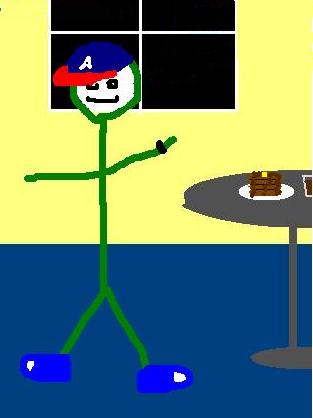As some of you may know, Starbucks has been putting quotes and sayings on their cups lately in what is known as the "The Way I See It" program. One of the recent quotes to appear on an 8 oz. cup was this little incoherant beauty, #167: "History without war - a good plan for the future." -- Nancy Wilson; Member of Heart. I'm not going to gripe about the fact that it's not a complete sentence...I mean, what would you expect from a musician whose most famous line is "Ooooh, Baracuda?" No, this particular one sparked some interesting speculation. Matt and I wondered...what would history be like without war? From the perspective of a history major, things get a little ridiculous. Without further ado, I present:
History Without War: The American Experience
One day, the British Parliament raised taxes in the American colonies. The Continental Congress had them over for tea. They all decided that it would be a great idea if the colonies would make treaties with the French and govern themselves.
In the early 19th century, British and French navies were impressing American sailors, and the British were hoping they might get their colonies back. The Americans decided they could do without the sailors, as long as the British would give them a fireworks show over Baltimore Harbor so a lawyer could write a patriotic poem to the tune of an Irish drinking song. Andrew Jackson didn't get the memo, and spent the whole time trapsing around the Louisiana bayou with a bunch of pirates.
In the 1840s, some white guys decided to settle on Mexican land in Texas without permission, and of course the Mexicans were okay with the fact that they wanted to be part of the United States. In fact, they were so happy about it, that they decided to throw in California, Nevada, Arizona, and New Mexico for no reason whatsoever!
When anti-slavery candidate Abraham Lincoln was elected president, 11 southern states decided they'd had enough of northern agression, and seceeded from the United States. When the Union states heard about it, they immediately mobilized a large force and spent the next four years lining up with guns and rationally debating the constitutionality of secession. In 1863, they debated the emancipation of the slaves too. In the end, the South decided to abandon their most precious institution and rejoin the US because the Union's arguements were so compelling.
About 30 years later, Theodore Roosevelt put on a silly hat and rode his horse around the Caribbean. Meanwhile, a bunch of American ships dropped anchor in the Phillipeans. The Spanish were too busy eating paella and drinking chocolate to care, and the American empire was born.
In the 1910s, the British, French, Germans, Italians, and Austro-Hungarians decided to spend a few years sitting in mud puddles. The Americans decided to join them, but they weren't wimpy and European enough, and the party broke up pretty quickly afterwords. For some reason, the Germans and French had a big spat about the bill for the croissants, and they both ended up poor and angry.
After that arguement, a young German artist named Adolf Hitler rose to power. He decided to kill all the Jews, but then he changed his mind, and went back to art school. The Japanese empire was going to try taking over the entire Pacific, but they got one look at Hitler's paintings and decided they couldn't go on.
In the '50s, the Koreans couldn't decide whether it would better to be communist or capitalist, so the US and the Chinese came over and they had a pie-eating contest to decide the winner. It was a tie, so they drew a line down the middle of the country and decided to stare across it at eachother for the next 50 years.
The Vietnamese communists challenged the capitalists to a game of hide and seek in the jungle. They were just too good at hiding, and nobody could find them. Then they went home in their helicopters.
After the hide-and-seek catastrophe, people wondered if the US would ever win another game of hide and seek...but more on hide and seek later. In 1991, Iraqi dictator Saddam Hussein invaded Kuwait. The US mobilized a large force. The tanks rolled up to the border, and were poised to roll across and violently crush the Iraqis in a storm of explosions and blood and death. But Saddam had recently been playing Risk 2210. He whipped out a card and said "Ha ha ha!!! George Bush!!! I have CEASEFIRE CARD!! You cannot attack me!" And he had to wait for his next turn to attack.
So, back to hide and seek. We found some Afghanis. Hooray!
When the US got their next turn, they went after Iraq again. Saddam considered fighting back, but decided that a better defence would be to make the US run the country themselves. Then he was hanged...for no reason at all.
Subscribe to:
Post Comments (Atom)


5 comments:
All I can say is yes, that is exactly what has happened.
Haha, that's great!
Are you saying...wait... are you saying this isn't what really happened?
It's amazing how one little coffee cup can turn into something like that. Frankly, I'm surprised. You should be ashamed of yourself, letting coffee cups influence you like that. If a coffee cup jumped off of a bridge, would you too? Tsk tsk tsk...peer pressure, what a beast!
If a coffee cup jumped off a bridge, I would write a blog post about the merits of jumping off of a bridge, and how society would have gotten nowhere if it were not for bridges.
Post a Comment